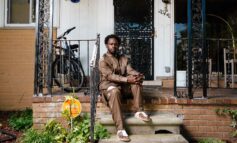When six Michigan Peace Team members booked trips to Egypt, they did so with the hope of crossing into Gaza and being part of a defining moment in the struggle to help free the besieged territory.

|
|
An international peace activist waves to Palestinians upon his arrival at Rafah border crossing in the southern Gaza Strip, December 6, 2010, Egypt had reached a deal with members of an aid convoy to take supplies to Palestinians in Gaza after protests overnight, but Cairo barred their private cars from crossing, an Egyptian security source said. REUTERS/Ahmed Zakot |
Michigan Peace Team member Kim Redigan of Dearborn Heights, who traveled to Cairo in hopes of marching, said she thought that Egypt’s refusal to let the 1,300+-member, 43-nation convoy through might actually help draw more much-needed attention to the plight of Gaza going forward.
“By not allowing us to go to Gaza to join the freedom march it really kind of backfired on them, I think we got more publicity from them keeping us out than letting us in,” she said. “Not in the United States so much, but I think we definitely got more press in Europe and the Arab world.”
Redigan also cited the “unprecedented” importance of a New York Times article about 85-year-old Hedy Epstein, a Holocaust survivor who initiated a hunger strike in Gaza among activists stuck inside Egypt.
The hunger strike was just one tool the activists used to keep the spotlight on the Egyptian government’s decision not to let their peaceful aid convoy into Gaza, which they found out about by e-mail just after arriving.
Peace team member Sherri Wander made the trip and said that activists held two or three demonstrations each day with 300 to 400 people participating in and around Cairo.
“We did our best to hold the Egyptian government accountable,” she said. “But the government declared any gathering of more than six people to be illegal so every time we gathered, even for a candlelight vigil, we were surrounded by riot police.”
While Wander said some of the police became pushy, even picking up and tossing one protestor into a designated area, many of them were sympathetic to the cause.
The Egyptian Civil Society also joined with the protestors at times according to Redigan. The society is suing the Egyptian government to stop construction of a wall that would block underground tunnels to and from Gaza which the locals use to smuggle in crucial supplies.
Despite the support from sympathizers, movement was difficult around the city as groups of protestors were often forced to split into smaller teams. The Peace Team and other activists were blockaded by police inside their hotel from the day they arrived and faced constant harassment.
Eventually, about 100 marchers out of 1,300 were allowed to go through to Gaza according to Redigan, but the group was given just a few hours to choose which people should go.
Among those chosen were journalists, videographers, and other marchers with special skills. Michigan Peace Team member and Palestine native Yusif Barakat was among those chosen to go, but he was only given two or three hours’ notice to ready himself to board the bus to Gaza at 7 a.m.
On December 31, 2009, with Barakat already having departed for Gaza, the remaining peace team members joined a modified version of the Gaza Freedom March as demonstrators took to the streets of Cairo for a symbolic March towards Gaza.
Wander called it essentially the biggest protest put on by the marchers who were left behind.
She spoke about the frustration she and other MPT members felt being so close yet so far away.
“It was very discouraging to be geographically so close yet have walls thrown up every step of the way,” she said. “We did some good though; I think for me it was important to begin to see the tip of the iceberg about what it might be like to try to organize in Palestine and it really brought home just how much Gaza is a prison,” she said.
Redigan also brought home similar impressions, but also saw some signs of hope during her time in Cairo.
“I think the one thing that sticks with me is how many police officers on the street were giving us thumbs up or verbal support when their superiors weren’t looking,” she said. “It seems maybe the Egyptian government is afraid of its own people, especially the younger police who were 19, 20.
“We created a crisis of conscience for them and that’s what Martin Luther King, Jr. always said non-violent resistance is supposed to do.”





Leave a Reply